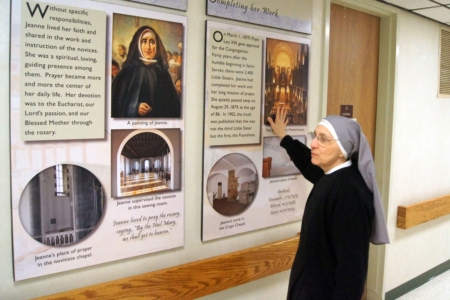Local
Somerville sisters make a 'home' for elderly
By Christopher S. Pineo
Posted: 2/10/2012


Mother Gertrude Mary Maiorino, LSP, shows the exhibit of St. Jeanne Jugan's life story that greets visitors at the Jeanne Jugan Residence in Somerville. Pilot photo/Christopher S. Pineo
SOMERVILLE -- Even as some are advocating in Massachusetts for the right of the elderly and terminally ill to end their lives, a group of sisters in Somerville is witnessing to the dignity human life can have up to the moment of natural death.
The Little Sisters of the Poor at the Jeanne Jugan Residence and the Jeanne Jugan Pavilion in Somerville continue the work of their foundress begun on a cold night in France 1839, when St. Jeanne Jugan brought an elderly, blind woman into her home and gave up her own bed.
"When they are being called home to heaven we sit with them; we stay with them; we pray with them. That is really sacred because of the fact that the next encounter they are going to have is with God," Sister Lorraine Barry said speaking to The Pilot, Feb. 6.
The facilities in the Somerville house, feed and treat elderly poor in what Mother Gertrude Mary Maiorino called a "family setting," in the tradition of the foundress opening her own home.
Mother Gertrude gave The Pilot a brief tour of the facility, where 13 nuns live with the 121 residents. The facility has a chapel and two priests who live on the premises.
"Although we have plenty of staff, we stay with them day and night," Mother Gertrude said.
The two buildings on the grounds of the home provide two different methods of serving the elderly poor.
The sisters make both assisted living and skilled nursing care available at the Jeanne Jugan Residence.
"Our residents are family for us, and we treat them like family," Mother Gertrude said
Mother Gertrude said despite the level of professionalism expected and provided by the staff, the facility must provide more than just what residents might need outwardly.
"Although quality care is very important, we do everything we can to help the staff understand that it has got to be in a home-like setting," Mother Gertrude said.
The sisters offer 27 one-bedroom, low-income apartments for seniors at the Jeanne Jugan Pavilion. Mother Gertrude said these arrangements provide residents with a measure of autonomy and security.
An enclosed walk way connects the building to the Jeanne Jugan Residence, where the sisters live and staff remains available 24-hours.
For residents in that building the amenities include a device with which each resident can call for help in an emergency.
"They press the button and it goes into my phone and it goes into the nurse's phone," Mother Gertrude said.
In that way, Mother Gertrude takes responsibility for each resident personally as St. Jeanne Jugan did.
St. Jeanne Jugan called the sisters of the order who first traveled to the United States the "first missionaries of the Congregation."
The sisters established their first home in the United States in Brooklyn, New York, in 1868, spreading to their first Boston location in 1870 when the Sisters of Notre Dame welcomed the Little Sisters of the Poor.
They established their first house in Roxbury in 1872, with two more to follow.
In 1883 they created another home in Charlestown, followed by one in Somerville in 1889.
As U.S. requirements for care of the elderly changed with federal legislation, the sisters combined and updated their facilities.
The sisters had their new home built behind the original on Highland Avenue, and they opened Jeanne Jugan Residence and Pavilion in 1978.
On their national website, the sisters make this vow, "By the look in his eyes or by the silence of his whole being, the elderly person who is near death asks us this question: 'Does my life still have any value? Is it worth living?' To each person we respond with a resounding yes!"
"St. Jeanne Jugan did not found nursing homes; she founded 'homes' to be really a home for these elderly poor people, and that's why we are called 'little sisters,'" Sister Majella Hargen said.
"We're not here for the grandeur of the work, we're here for the grandeur of God," Sister Lorraine added.